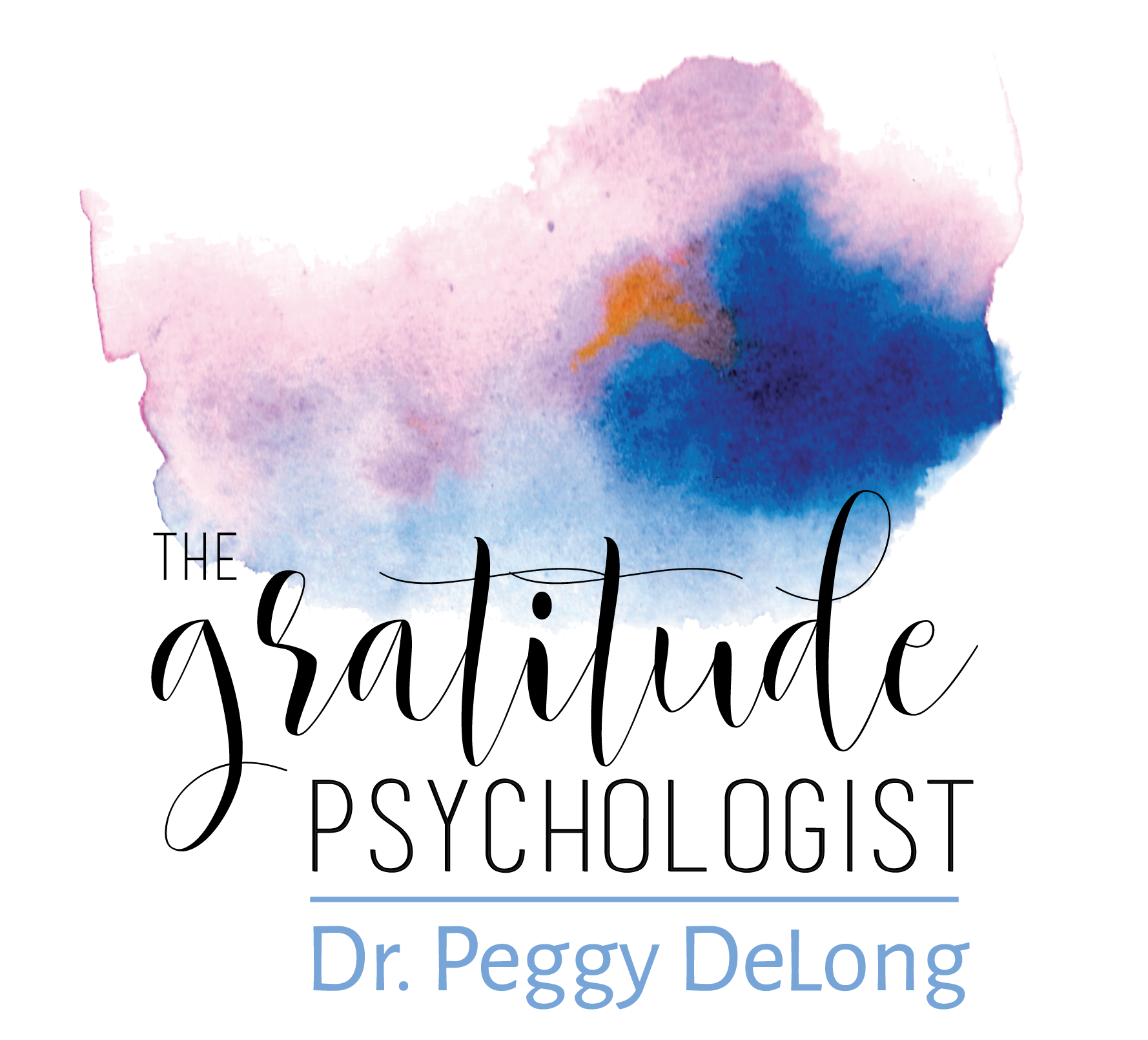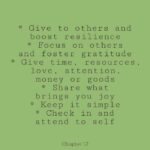
The Healing Power of Giving to Others
Give to Others
“True happiness comes from the effort of making others happy. Give and share your love every day.” –Tinku Razoria
One of the best ways to feel more peace and happiness is to give to others. The overall gains are twofold. Someone benefits from your kindness, time, and/or generosity, and you feel better yourself. In addition, doing for others helps take the focus off of our own issues. Rather than being an act of charity, it reinforces that we all have struggles, and by giving when you can to help make someone else’s day a little brighter, your day will be brighter, too.
Psychologists now say that resilience is the “new happiness.” Resilience is the ability to recover and grow in the face of adversity. We simply cannot be happy all of the time, as no one is without problems. Instead of pursuing happiness, psychologists are recommending that people build resilience.[i] Resilience involves several factors, including social competence, forgiveness, empathy, autonomy, and problem-solving ability. Guess what boosts resilience? Giving to others. Studies have found that people who give to others have high levels of resilience.[ii] It does not need to be fancy, elaborate, time-consuming, or expensive. Simple examples include delivering meals or providing rides for someone going through a difficult time, driving a child for a busy mother who is juggling schedules, or donating to the local food pantry. The possibilities are endless!
Let’s go deeper into some of the reasons giving helps our mental health. First, it is a distraction from our own worries and concerns. When we go through a difficult time ourselves, focusing on other people and their needs momentarily takes us away from the difficulties in our own lives; it gives us perspective and a break. This is not to say that we should ignore our own problems. In fact, be careful that you don’t use giving as a way to excuse or ignore your own issues. Make sure that you continue to deal with your own problems after helping someone else.
Helping other people makes us realize that we are not alone, especially in the struggles of life. Everyone is dealing with something. Often when we give to others, we realize that everyone struggles and has difficult situations. This helps us to feel less alone in our own challenges.
Most of the time, our giving involves being with other people, either as recipients or collaborators. As human beings, we are wired to be social. These social connections help fulfill a basic human need and boost our mood. A 2006 study at the National Institutes of Health by Jorge Moll found that helping others activates the region in the brain that is responsible for pleasure, trust, and social connection, leading to what may be referred to as the “helper’s high.”[iii] In addition, all these connections help to build our social support network, which in turn helps with resilience. Having people to turn to for support and assistance during times of difficulty helps us to cope during these times. The more resilient we are, the happier lives we live. Life is filled with problems; we can bounce back and feel better when we are resilient. Helping others also leads to stress reduction, which in turn boosts physical health. Rachel Piferi and Kathleen Lawler found that people who gave to others had lower blood pressure, which is associated with lower stress levels.[iv]
Here’s another benefit: giving to others helps foster gratitude, especially for what we have and what’s going well in our lives. People who regularly support others in some way have higher levels of perceived happiness.[v] Another study found that simply giving to others through sending a thank you note to someone improved mental health functioning.[vi]
Let’s look at some ways that you can give to others:
Give time. Organize a food or clothing collection. Be a big brother or sister. Mentor a young professional. Visit a senior center or veteran’s hospital. Volunteer as a scout leader or through a Parent Teacher Association. Serve on a township committee of interest. One study found that people who volunteered more than once monthly but less than once weekly were 12 percent more likely to report happiness than people who had not volunteered.[vii] Another study of 13,000 adults age fifty and over found that those who volunteered two hours a week had more positive affect, optimism, and a sense of purpose in their lives. They also had less loneliness, hopelessness, and depression.[viii]
Give resources. If you have an area of knowledge or expertise, see who needs it. Share your knowledge or talent. Run a workshop at a local library. If you are an attorney, offer your knowledge to a domestic violence shelter or other agency. If you are a mental health professional, offer a free workshop in your community. If you are a landscaper, mow the lawn of someone who is ill or grieving. If you are healthy and able, give blood during a blood drive.
Give love and attention. Visit seniors living alone in nursing homes. Go to a children’s hospital and read to children or play games. Sing at a veteran’s hospital.
Give money or goods. Donate to a Go Fund Me for a person needing help. Donate to the Red Cross after a natural disaster. Take all the stuff you don’t use to Goodwill. Elizabeth Dunn and Lara Aknin (2008) found that people who spent money on others had higher levels of happiness. The conclusion was that spending financial resources on others fosters happiness.[ix]
After my fiancé died, I felt so much better helping others who were also affected by a cancer diagnosis. As a volunteer, I visited children on the oncology floor of the hospital that was across the street from my apartment. I remember one boy in particular, Christopher. He was three years old, with blonde hair and a smile that melted my heart when I entered his room. He was usually feeling well when I visited, and he enjoyed going down the hall to the playroom, holding my hand as we walked. We played with blocks and cars, and I read books to him. His mother was there most of the time, but she also had an infant to take care of. I spent time with Christopher so that she could rest or spend some one-on-one time with her baby. While it was difficult to see so many children suffering, it helped me feel less alone in my grief and in the sadness associated with caring for someone who is gravely ill. Most of all, it gave me purpose at a time when I thought I had none.
In my grief over losing my father and my fiancé, there was a time where I felt like I meant nothing, even though that was never true. When my fiancé died, I felt as though my future had vanished. Losing my father felt like my childhood was forever gone. I was a lost adult, questioning my existence. Giving my time and love to those children helped me more than it did them.
Take Action
- What brings you joy? What are you good at? How can you give to others by sharing your joy, knowledge, or talent?
- Keep it simple. Remember that it does not need to be something big or take huge amounts of time. Sometimes these beliefs prevent people from taking the first step. You can always build upon what you start to do.
- Which way of giving suits you? If you don’t have much money to spare, give your time. If you have a full schedule but have money, provide a financial donation.
- Don’t use giving to others as a distraction from dealing with your own problems. Take a break from them, but don’t neglect them. After spending time and energy giving to others, check in with yourself and your own life to see what problems or issues may need your attention.
- Your way of giving is unique to you, so don’t compare yourself to how others do it. Do what feels good to you.
[i] Universitat Autònoma de Barcelona, “Resilient people more satisfied with life,” ScienceDaily. (accessed August 15, 2019), www.sciencedaily.com/releases/2012/05/120523114726.htm
[ii] Morley Glicken, “Helping Others as an Attribute of Resilience,” in Learning from Resilient People: Lessons We Can Apply to Counseling and Psychotherapy (Thousand Oaks: SAGE Publications, 2006).
[iii] Jorge Moll, Frank Krueger, Roland Zahn, Matteo Pardini, Ricardo de Oliveira-Souza, and Jordan Grafman, “Human Fronto–Mesolimbic Networks Guide Decisions About Charitable Donation,” Proceedings of the National Academy of Sciences, 2006.
[iv] Rachel Piferi and Kathleen Lawler, “Social Support and Ambulatory Blood Pressure: An examination of Both Giving and Receiving,” International Journal of Psychophysiology 62, no. 2 (2006): 328-336.
[v] Keito Otake, Satoshi Shimai, Junko Tanaka-Matsumi, Kanako Otsui, and Barbara Frederickson, “Happy People Become Happier Through Kindness: A Counting Kindness Intervention,” Journal of Happiness Studies 7, no. 3 (2006): 361-375.
[vi] Y. Joel Wong, Jesse Owen, Nicole T. Gabana, Joshua W. Brown, Sydney McInnis, Paul Toth, and Lynn Gilman, “Does Gratitude Writing Improve the Mental Health of Psychotherapy Clients? Evidence from a Randomized Controlled Trial,” Psychotherapy Research 28, no. 2 (2018): 192-202.
[vii] Francesca Borgonovi, “Doing Well by Doing Good: The Relationship Between Formal Volunteering and Self-Reported Health and Happiness,” Social Science and Medicine 66 (2008): 2321-2334.
[viii] Eric S. Kim, Ashley V. Whillans, Matthew T. Lee, Ying Chen, and Tyler J. VanderWeele, “Volunteering and Subsequent Health and Well-Being in Older Adults: An Outcome-Wide Longitudinal Approach,” American Journal of Preventive Medicine, (2020): 1-11.
[ix] Elizabeth Dunn and Lara Aknin, “Spending Money on Others Promotes Happiness,” Science 319 (2018): 1687.



Leave a Reply